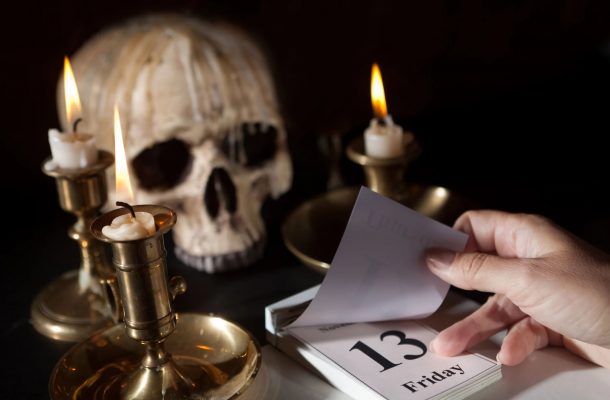It’s the largest single-syllable number in English and the symbol of cosmic order; there are 12 months of the year, 12 hours on a clock face, and 12 signs of the zodiac.
There are also 12 items in a dozen, 12 inches in a foot, and 12 pairs of ribs in the human body.
It is, in mathematics, a number that has a perfect number of divisors, and the sum of its divisors is also a perfect number.
Even the European Union flag has 12 stars, which has nothing to do with the number of member countries (there are 28 … for now).
In Christian tradition, there are 12 days of Christmas, and in the traditional Christmas song there are 12 gifts that “my true love” sent.
It’s also considered a divine number. There were 12 apostles at the Last Supper. In ancient Greece, the Greeks worshipped 12 gods of Olympus, and there were the 12 labours of Hercules. In the Hebrew scripture, there were the 12 tribes of Israel.
So, spare a thought for 13.
Forever in the shadow of the ‘perfect’ number 12 in the numerical order of things, it also carries the heaviest burden of superstition, being widely associated with bad luck, although, it has to be said, the superstition isn’t universally accepted.
In Italy, for instance, the number 13 is considered lucky, with the expression fare tredici meaning you’ve hit the jackpot.
Notwithstanding this, the number could do with some positive public relations spin.
It’s considered unlucky to have 13 guests at a dinner party, many buildings skip naming a 13th floor, some airlines (though only a few) avoid numbering a row ‘13’, and some people avoid getting married or buying a house on a day marked by the number 13.
Scholars, history sleuths and theorists trace the root causes of the fear of 13 mostly back to Norse mythology and Christianity, relating them particularly to 13 guests at a dinner party.
The legend is neatly massaged to fit the fear to help try and explain the unexplainable; a constructed belief, if you like, where it’s easy to find evidence to support it.

In the Norse myth there was a celebration of food and games, to which the god Odin invited 12 others. It was to celebrate his son Balder, the god of truth and light. But a 13th god, Loki, arrived. Described as a trickster and scheming coward, he was jealous of Balder and so convinced another god, the blind Hoder, to throw a mistletoe-tipped spear at him, killing Balder instantly.
Scholars, history sleuths and theorists trace the root causes of the fear of 13 mostly back to Norse mythology and Christianity, relating them particularly to 13 guests at a dinner party.
Balder’s death was said to have plunged Valhalla into mourning and darkness.
In Christianity, the Last Supper feeds the fear. The biblical reference relates to the number of diners at Christ’s last meal before his crucifixion, the 12 apostles and Jesus. Judas Iscariot, the apostle who betrayed Jesus, is often referred to as the 13th diner.
Still others consider the vilification of 13 a deliberate patriarchal act in response to the pre-Christian, pagan worship of femininity and the 13 moons in the lunar calendar, which correlated to the female menstrual cycle.
Freaky Friday
So embedded now is the fear of 13 in our consciousness it even has a clinical term, triskaidekaphobia, triskaideka being the Greek word for 13.
If 13 should fall on a Friday, such as will happen this month, the fear takes on a whole new morbidity. This also has a clinical term: paraskevidekatriaphobia (from Paraskevi, Greek for ‘day of preparation’) or friggatriskaidekaphobia (after Frigg, the Norse goddess after whom Friday is named).
It occurs at least once every year, sometimes twice and occasionally three times.
For Friday and 13 to conspire, the beginning of the month in which it falls must be a Sunday. This occurs three times a year when a leap year begins on a Sunday, or when a common year begins on a Thursday.
Burkard Polster is a senior lecturer in the school of mathematical sciences at Monash University. In a column for The Age in 2009 (a year in which Friday the 13th occurred three times), he calculated the mathematical probability of 13 falling on a Friday, based on the Gregorian calendar introduced on the orders of Pope Gregory in 1582.
“The Gregorian calendar … is based on a 400-year cycle. The cycle refers to the choosing of leap years, but it turns out that a 400-year period contains 146,097 days, which comes to exactly 20,871 weeks,” he wrote.
“This tells us that the days of the week have the same 400-year cycle … This means that to determine the frequency of Friday the 13th, we just have to check through the 4800 months in a 400-year period, and count the number of spooky Fridays.”
Having done so, he worked out that the frequency of the 13th falling on a Friday was higher than any other day of the week (688 times, or 14.3 per cent). The lowest frequency was a Thursday or Saturday (684 times, or 14.25 per cent).

the Friday the 13th film franchise.
Pushed by pop culture
The Friday the 13th superstition, like the origins of the fear of number 13, is shrouded in myth, but also perpetuated by popular culture.
Anyone who’s read Dan Brown’s blockbuster The Da Vinci Code, and many who haven’t, would know of the Knights Templar.
They were a devout order of medieval Christians, set up by a French knight named Hugues de Payens, whose mission was to protect Europeans travelling to the Holy Land.
They were a powerful and wealthy order. King Philip IV of France, who was deeply in debt to the Templars, ordered hundreds of them be arrested on Friday, 13 October, 1307. Many were later brutally tortured and burned alive.
A more definitive reference to Friday the 13th can be found in a novel written by American businessman Thomas Lawson and published in 1907, titled … Friday the 13th: A Novel, about a stockbroker’s attempt to crash the market on that day.
Eighty-two years later, as if to reinforce the superstition, the Dow Jones Industrial Average fell 190.58 points on Friday, 13 October, 1989. Described as a “mini-crash”, it represented a 6.91 per cent drop in the index and is often referred to as Black Friday.
But by far the most popular and pervasive cultural reference that perpetuates the Friday the 13th superstition is the Hollywood horror/slasher movie franchise Friday the 13th, of which there are 12 instalments.
The fear factor
Peter Norton is a Monash University psychology professor, director of translational research at the Monash Institute of Cognitive and Clinical Neurosciences (MICCN), and director of the FEAR Clinic.
He says humans are hardwired to find patterns in things, even where none existed, which is why some people hold fast to bad-luck superstitions such as walking under a ladder or crossing the path of a black cat. Or that something terrible will happen on Friday the 13th.
“Our brains are basically pattern recognition machines,” he said. “We see patterns everywhere and piece together our expectations based on them.
“The problem that humans face is that we’re really good at making excuses for our patterns. If I expected something bad would happen on Friday 13th, but nothing bad happened, I might assume that nothing bad happened because I wore, say, a cross that day.
“What my brain then learns, though, is that something bad would have happened, but the cross protected me from the bad thing.”
He says having fears, as distinct from superstitions, is normal and healthy.
“Fears work to keep us alive,” he says. “A fear of getting mugged if you live in a high crime area, for instance.
“A superstition would be similar, but usually it’s not fully rational and is out of proportion to the actual danger, like the fear of the number 13 or Friday the 13th.”
Phobias, on the other hand, imply there’s a negative impact.
“I might have a superstition about walking under a ladder, but since I don’t often encounter ladders in my day-to-day life, it really doesn’t impact me. But if I worked in construction, and was finding it difficult to go to work because of the ladders and scaffolding, then it would be more likely to reach the level of a phobia.”
“If it’s true, as seems plausible to me, that another superstition would fill the void left by the weeding out of the Friday the 13th superstition, maybe we should be content to make our peace with it.” – Professor Graham Oppy
He says people who experience a phobia will go to great lengths to avoid the perceived risks associated with that phobia.
“I would guess that people with a phobia of Friday 13th would probably try to stay home, call in sick, not make major decisions, or avoid risks on that day like flying or being out after dark. They may also try to mitigate the risk by doing things like praying, wearing religious symbols (like a cross), or the like.
“The fear experienced is no different to the fear you would feel if a car was racing right at you. With phobias, it’s just that the danger someone is anticipating is, like superstitions, out of line with the actual amount of danger or threat that the thing poses.”
He adds that people can develop phobias and superstitions to pretty much anything, and that they can be traced back to a combination of three things:
Genetics
“About 40 per cent of our risk of developing phobias (or any anxiety disorder) seems to be genetically linked,” he says.
“It doesn’t determine who will or will not develop a phobia, but it increases the chances. Just like height increases the likelihood of being good at basketball, but doesn’t determine whether or not you’re good. It just sets the stage.”
Early life experiences
“In our formative years, we learn a lot about whether the world is safe or dangerous, controllable or unpredictable.
“Children who are raised in family environments that tend toward uncontrollability (parents either not letting you try new things/helicoptering, or families where things are truly unpredictable or threatening) tend to be more likely to be susceptible to developing phobias or anxiety disorders.”
Direct/indirect experience
“People at risk often will report negative experiences with the phobic situation at the onset of their phobia.
“This is sometimes direct (getting bitten by a dog, or having a really bumpy flight), but can also be indirect … either seeing something bad happen to someone else (seeing a brother get bitten by a dog), or through information (hearing that Friday 13th is evil, or news reports about roving packs of vicious dogs).”
Part of being human
Graham Oppy, a Monash University philosophy professor, wonders whether human susceptibility to superstitious thinking generally is a bug or a feature of human cognition.
“There are reasons to suppose that superstitious thinking is sometimes beneficial to individuals and groups,” he says. “It could, for instance, serve as a marker of identity.”
To be invested in superstitious thinking can sometimes also help when we have to make decisions on the basis of meagre information, he says.
“Believing that methods of divination work can help us to make robust decisions. And, often enough, making decisions and sticking to them carries the day, no matter what decision is made.”
Even so, he says it’s “hard to see any beneficial consequences that flow from investment in the Friday the 13th superstition”.
“While this superstition has other attributes that make for success for superstitions – for example, that it relies on an initially counter-intuitive claim that’s easily remembered and transmitted – it’s hard to identify a useful function that it serves. At least on the surface, it seems to be a bug.”
But he questions the value in trying to disabuse people of the superstition.
“If it’s true, as seems plausible to me, that another superstition would fill the void left by the weeding out of the Friday the 13th superstition, maybe we should be content to make our peace with it.”
This article was published by Lens.














